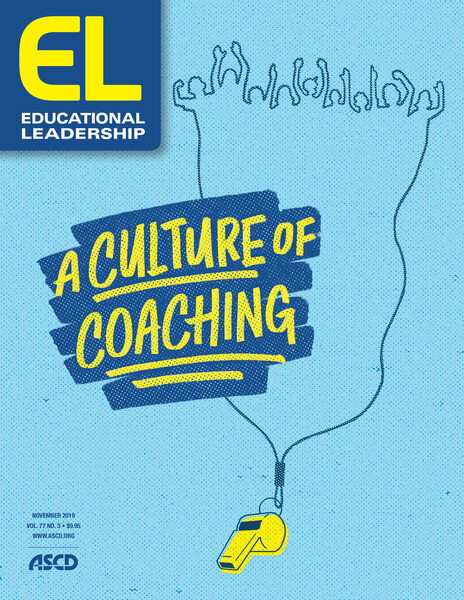Listen to an audio version of this article.
As a consultant who trains coaches to work effectively with teachers, I know that coaching is truly one of the most pivotal ways we can transform school culture and raise achievement. Coaching creates conditions of excellence by increasing collaboration, individualizing support, and fine-tuning teacher practice. When educators support one another in trying new ideas, a culture of collaboration forms and ultimately contributes to improved collective teacher efficacy.
What I also know, however, is that leaders need to understand their school's readiness for coaching so that administrators, coaches, and staff start from the right place. For example, a school where teachers typically teach in their rooms with the door shut, aren't used to feedback, and are uncomfortable when an administrator "pops" into their class is at a very different starting point than a school that already has a culture of feedback, regular classroom walkthroughs, and teachers observing each other.
Why does the starting point matter? Well, it's a bit like swimming lessons. We hope our little ones learn to get acclimated to the water and try techniques to float and hold their breath before getting thrown into the deep end of the pool. In the same way, it is important to establish certain foundations for a coaching program so that trust and acceptance are strong enough for coaching to be welcomed and impactful. Before, essentially, you throw your teachers into the deep end of the pool called "coaching."
Does that mean a school shouldn't implement a coaching program until it is "ready?" Of course not. However, school leaders need a realistic understanding of teachers' mindsets and openness to feedback and how well the school is structured for coaching so that they can build the coaching program the way you teach a child how to swim: systematically, intentionally, and with support.
Are You Ready for This?
Too often, I see school leaders implementing great programs or coaching strategies without first determining how ready the culture is for such initiatives. So how do you know where a school stands in its readiness for coaching? When I work with school leaders and staff, I have them complete a self-reflection exercise that includes a checklist (Figure 1) designed to help them not only individually reflect on their school's readiness, but also to come together and compare their reflections to develop a cohesive understanding of where they are, where they need to be, and how they are going to get there.
Figure 1. Where Is Your School's Culture of Coaching? A Self-Assessment for School Leaders
Rate each statement below using 0–5
(0-never, 1-rarely, 2-sometimes, 3-often, 4-very often, 5-always).
(0-never, 1-rarely, 2-sometimes, 3-often, 4-very often, 5-always).
Assessing Your School's Readiness for Coaching - table
| 1 | The principal is present daily in most or all classrooms for non-evaluative purposes. | |
| 2 | Administrative team leaders are present daily in most or all classrooms for coaching (non-evaluation) purposes. | |
| 3 | Teachers' doors are always open, and anyone can come in at any time. | |
| 4 | Staff are informally observed without prior notice. | |
| 5 | Staff receive feedback in-the-moment or after an observation verbally or via email. | |
| 6 | School leaders receive regular feedback and coaching. | |
| 7 | Staff observe each other at least once a month and give each other feedback. | |
| 8 | Staff give each other feedback outside of classroom observations verbally or via email. | |
| 9 | Staff are coached to support their academic rigor, cultural competency, and/or belief systems/mindsets in addition to pedagogical practices. | |
| 10 | Staff share their coaching targets with others so they can get multiple points of view and feedback. |
I developed this checklist after observing schools that had more success with coaching than others. I noted observations about the culture of these schools, their practices around giving and receiving feedback, and how often leaders were present in classrooms. In addition, I collected anecdotal evidence on teachers' mindsets about being coached and receiving feedback and how it compared to the school's growth. As I observed and noted shifts in classroom practices, I was able to identify themes around states of coaching readiness and coaching mindsets.
When leaders and teachers self-reflect using this tool, it allows them to look at their school's existing practices and see which are most conducive to ensuring a strong culture of coaching. The checklist is organized in a hierarchy from basic, foundational coaching practices to deeper, more intensive practices that require a stronger culture of coaching. The higher the scores are at the top, the quicker we can get into deeper levels of coaching. The lower the numbers are at the top, the more culture-building and foundational work a school needs to do so that coaching is built on shared empowered mindsets.
Reflecting on this checklist also gives schools specific action items to work on. For example, if classroom walkthroughs by school leaders are a rare occurrence, that may be one practice a school decides to put in place, because if deeper coaching is to take place, there has to be a level of comfort and acceptance with people coming into each other's classrooms.
I often suggest that, after reflecting on the checklist, a good starting point for a school team is to determine where they want to get to within a year and backwards plan from there. A few questions to ask to help a school decide how far it can get in building a coaching culture are:
- What are our staff members' mindsets and beliefs about student learning and achievement?
- How open are staff to change and implementing new practices to ensure more students are learning?
- Are staff overwhelmed by initiatives, changes, or other mandates?
School leaders should take into account the answers to these questions before deciding what their goal is in establishing coaching practices in their school. As practices are implemented, it is important that leaders share progress, roadblocks, and next steps with teachers and staff and give opportunities for feedback. Transparency, along with purpose, will build strong foundations for more in-depth coaching practices later.
A word of caution: simply implementing items on the checklist won't yield a culture of coaching. Getting to that point will require deep relational trust-building while consistently visiting and revisiting mindsets, beliefs, and purpose for doing this work. And yet, a school coaching-readiness checklist can be valuable in helping educators discover what practices need to be in place so that a culture of coaching can grow and be sustained. If you learn the fundamentals of treading water, it will be that much easier to jump off the diving board into the deep, enriching waters of coaching.







